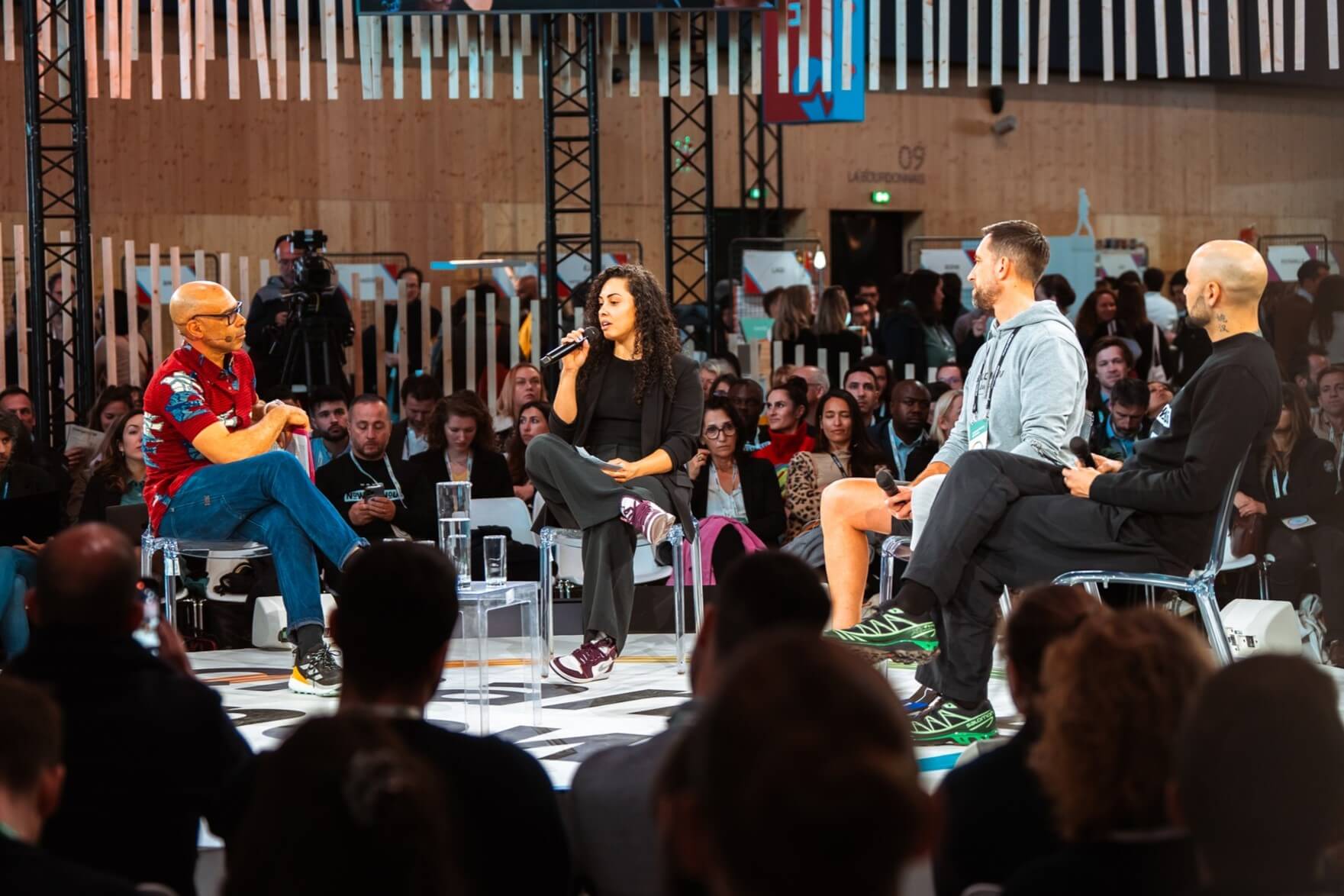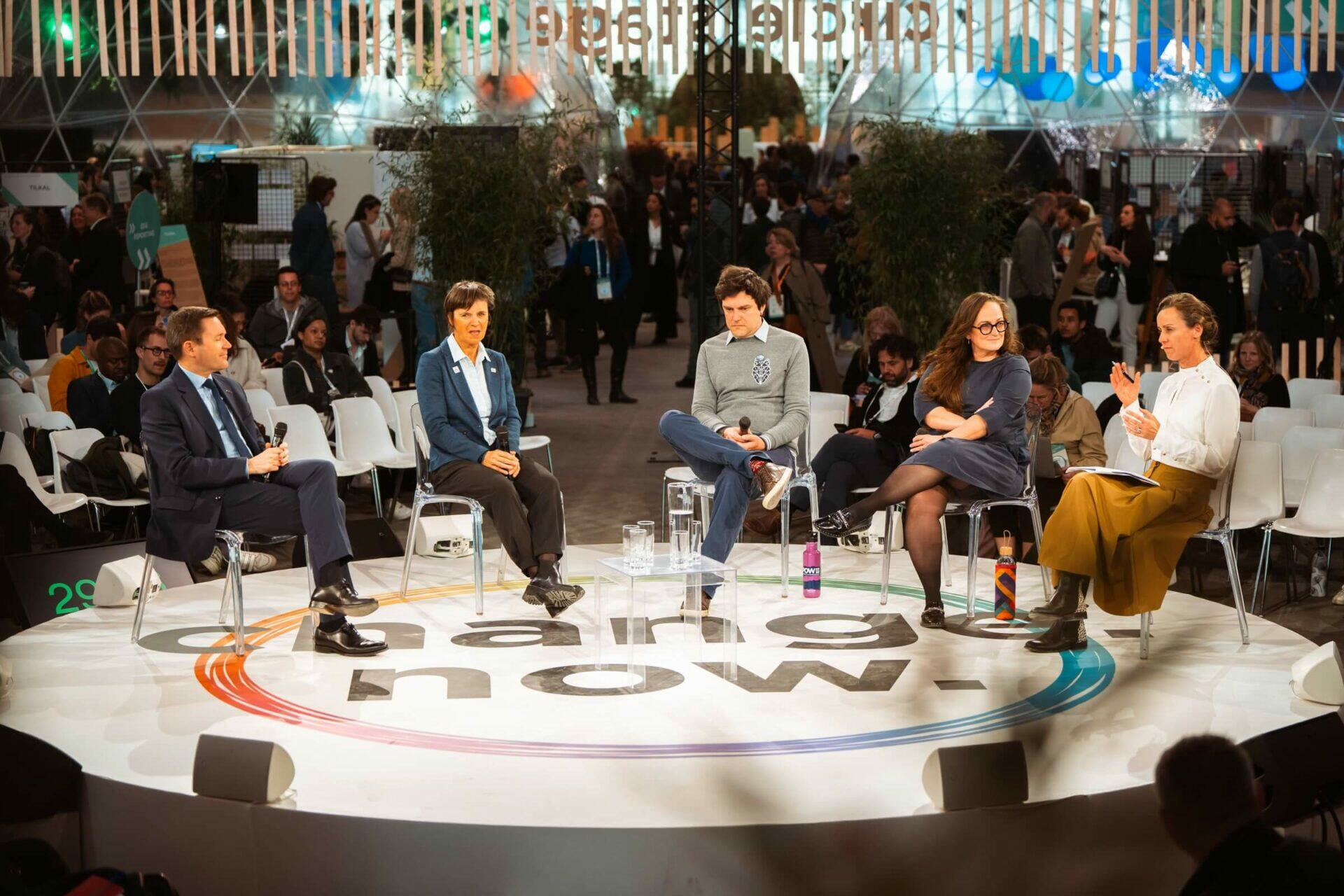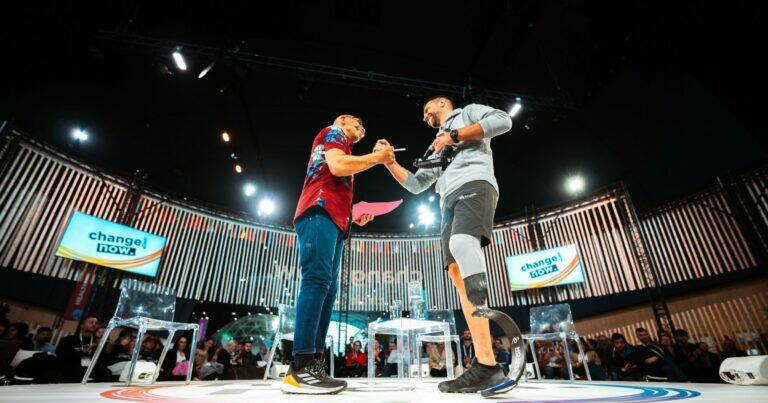Key Insights from ChangeNOW 2024 on Sports
This July, as Paris prepares to host the Olympic and Paralympic Games, sports enthusiasts are focusing on the City of Light. Despite its vast influence, the sports industry lags in the social and ecological transition. Ultra-trailer Kilian Jornet, holder of multiple world records and world champion titles, stated: “Sport is continuing to use the same model that it has been using for decades, and that is not sustainable.”
Athletes today have a crucial role, not just in winning medals for their countries but in driving change within the sports industry and beyond. At ChangeNOW 2024, athletes, officials, sports teams, and journalists came together to discuss the role of sports in addressing climate change and inclusion, and to explore solutions to fast-track a mindset shift within the industry.
Falling Behind: the Impact of Climate Change on the Sports Industry
From the conference “The big shift in sport: who and how?“, Thomas Deyriès, Margot Chave, Imanol Corcostegui, and moderator Keme Nzerem (left to right).
Sports are not immune to climate change’s impact: from infested lawns halting soccer matches to heatwaves interrupting the Tour de France, the industry is hit just as hard as others. Imanol Corcostegui, Editor-in-chief of L’Équipe Explore, noted, “Even if the world of sports would like to be in a bubble protected from climate change, or wants to be pure entertainment, it’s not possible.”
Margot Chave, Sustainability Expert at Sport 1.5, explained, “We act afterwards, and the thing is, with climate change, because it’s still happening, if you react to the thing that has passed, you’re not going to have a solution for the future.”
Mountains in particular are true sentinels of climate change, on the brink of rapid and major transformations. With the effects climate change is currently having on mountainous areas, certain sporting disciplines could end up disappearing altogether. To protect these natural environments, as hydrologist Emma Haziza said, “we won’t be able to do exactly as we always have, we’re going to have to totally reinvent ourselves, reinvent our models.”
Discover the conferences on sports
The big shift in sport: who and how?
Driven by the vision that the ecological transition and sport can rhyme, we welcome the testimonies of several athletes aware of the power of influence they have. Some of them are actual opinion leaders in our modern societies. As an entire sector faces the challenges of transition, we will explore new narratives as well as the concept of adaptation to define the sport of tomorrow.
With John McCalla-Leacy (KPMG), Kilian Jornet (Athlete), Boris Ghirardi, (Athlete, Level Up, Salomon), Lya Bavoil (World Champion Powerlifter, Lya Powerlift), Yohan Benalouane (Professional Football Player, No Water No Us), Margot Chave (Sport 1.5), Imanol Corcostegui (L’Équipe Explore), Thomas Deyriès (Upian), Georgina Grenon (Paris 2024)
Jeux olympiques et paralympiques d’hiver : comment aligner un méga événement avec les défis environnementaux de la montagne ?
At a time when global warming is affecting mountain areas more rapidly than the rest of the planet, is it possible to organize major sporting events in the mountains in a sustainable way? On the eve of France’s potential hosting of the 2030 Olympic and Paralympic Winter Games, it is essential to consult, engage and collaborate with diverse stakeholders and solutions to ensure a positive impact.
With David Lappartient (CNOSF), Antoine Pin (Protect Our Winters France), Perrine Pele (Organizing Committee Alpine World Championships 2023), Emma Haziza (Hydrologist, Mayane Labs)
The Environmental Footprint of Sports
The environmental impact of the sports industry ranges from the carbon footprint of travel and infrastructure – soccer being the most polluting sport during World Cups – to water, pesticide, and fuel consumption, with skiing, golfing, and Formula 1 being major offenders[1].
Worldwide travel for competitions is definitely one of the biggest sources of pollution for the sports industry: “the question of mobility is much broader than technical issues, and also it raises the question of where the people who come to our mountains come from” mentioned Antoine Pin, Head Manager of Protect Our Winters Europe.
Solutions do exist, but involve a major system shift, as Kilian Jornet reminded: “We need to associate with the federations and to rethink how we can change this model of competition. In the future, it should, in my opinion, involve less traveling and highlight events that are made locally.” We’ll have to question not only travel habits and infrastructure, but also find “partners who are committed to sustainability objectives”, as mentioned by CNOSF President David Lappartient.
From the conference “Jeux olympiques et paralympiques d’hiver : comment aligner un méga événement avec les défis environnementaux de la montagne ?“, David Lappartient, Perrine Pele, Antoine Pin, Emma Haziza and moderator Ingrid Beutler (left to right).
From Training Athlete to Sustainability Champion
A significant shift in mindset is needed for the industry to catch up. John McCalla-Leacy, Global Head of ESG & UK ESG Vice Chairman at KPMG, proposed a path mirroring athletes’ preparation. They train for years, focusing on six processes: “Embrace innovation,” “Meticulous planning,” “Focus on the process,” “Understand the environment,” “Re-imagine what is possible,” and “Team & I.” McCalla-Leacy suggested applying these principles to the “relentless pursuit of sustainability.”
Just as athletes prepare for international competitions, similar dedication can drive social and environmental transitions. He emphasized that everyone can contribute: “You have the potential for your roles to drive change which will transition us all to a fairer and more just and low carbon economy which is right for today and from generation to generation.”
Voices for Good

From the conference “The big shift in sport: who and how?“, moderator Keme Nzerem, Lya Bavoil, Boris Ghirardi and Yohan Benalouane (left to right).
Boris Ghirardi from Team Salomon echoed this sentiment, “We can imagine a future with accessible sports, with diversity, but also with respect for the environment; we just have to think differently.” Sports can foster bonds, reduce tensions, combat discrimination, and promote inclusion and accessibility. Talking about her own experience with accessibility, World Champion Powerlifter Lya Bavoil highlighted the need for more role models, saying, “The first step is to introduce more people with autism to talk about it in order to spread the word that it does exist.”
To involve everyone, more voices need to rise so that all stakeholders feel they have a part to play. Among these voices, athletes’ are the strongest. Professional football player Yohan Benalouane urged his peers to “try to be an example,” to which Boris Ghirardi added, “We have to inspire action.” Athletes, as influential figures worldwide, have the ability, and some responsibility, to lead by example.







